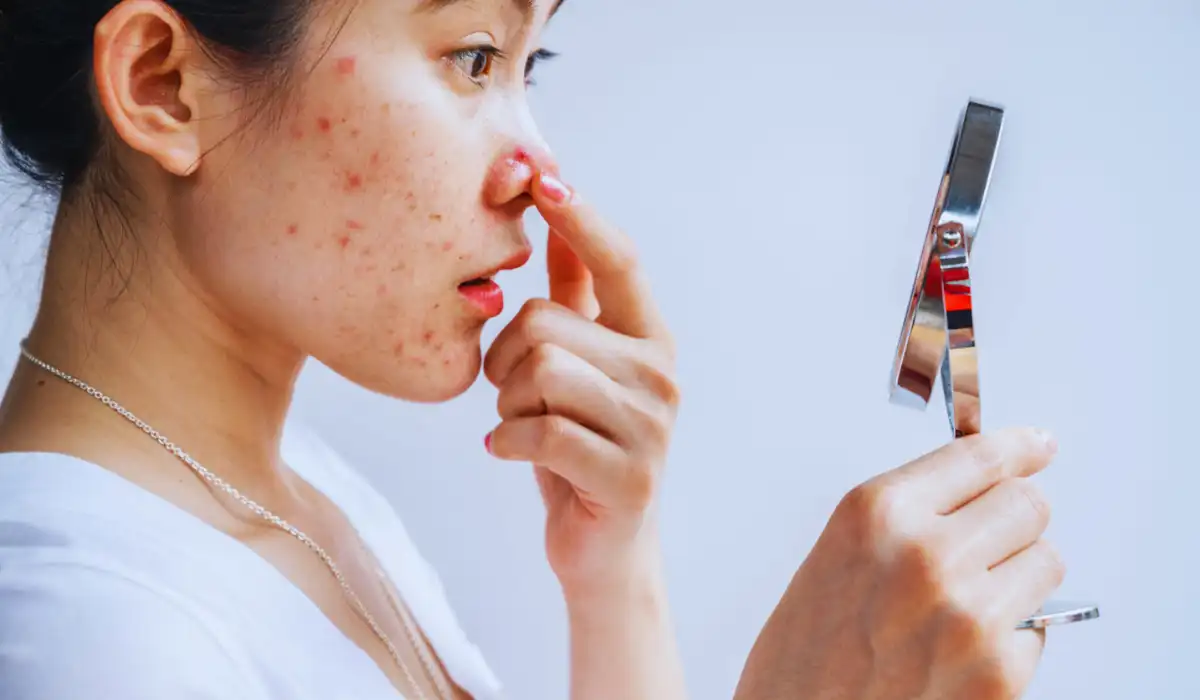Period acne is a frustrating condition many women experience during their monthly cycles. It is often called “period pimples” or “menstrual acne.”
Hormonal changes before and during menstruation often lead to these unwelcome breakouts. Hormones like estrogen, progesterone, and testosterone fluctuate during your menstrual cycle.
This can increase skin oil production, leading to period-related acne. Although a common issue, it can be quite distressing and impact self-esteem.
The good news is that various home remedies can help you tackle period acne. They can aid in achieving clearer and healthier skin.
What Are The 10 Home Remedies To Prevent Period Acne?
Following are 10 home remedies that can help you ease your pimple problem and heal your acne-ridden skin:

1. Cleanse Your Face
A cornerstone of any effective acne care routine is gentle facial cleansing. Opt for a mild, sulfate-free cleanser and use it daily to remove dirt, excess oil, and makeup.
It’s important to use lukewarm water. Hot water can strip away essential moisture from the skin, potentially worsening acne.
Avoid vigorous scrubbing. Harsh cleansing can further irritate the skin, leading to more breakouts; just pat your dry skin gently with a soft towel.
This minimizes rubbing and additional irritation.
2. Hydrate Your Skin
Moisturization for skin is crucial, even if your skin is prone to acne. Select a moisturizer that won’t clog your pores and is non-comedogenic.
Moisturized skin doesn’t make as much oil, which means fewer new pimples. Moisturize in the morning and at night to keep your skin’s moisture level right.
Hydrated skin typically produces less sebum, diminishing the chances of new breakouts. Consistent moisturization, both morning and evening, ensures an optimal skin hydration balance.
3. Tea Tree Oil
Tea tree oil has the ability to fight bacteria and reduce inflammation. This makes it a great option for treating acne.
To use it, simply mix a drop of tea tree oil with jojoba, coconut, or grapeseed oil in parts. Dab this mixture directly onto pimples using a cotton swab or clean fingertip.
Tea tree oil eliminates acne-causing bacteria. It reduces redness and swelling and promotes skin healing.
However, it’s important to be cautious, as tea tree oil can come off as strong and may cause irritation in some people.
4. Honey and Cinnamon Mask
A honey and cinnamon mask can serve as a soothing and effective treatment for period acne.
To prepare it, mix 1-2 tablespoons of honey with a teaspoon of cinnamon powder to create a thick paste. Apply this mixture to your clean face, focusing on areas with acne.
Honey has antimicrobial properties that combat bacteria. Cinnamon has anti-inflammatory properties that reduce redness and swelling.
Leave the mask for 15-20 minutes before rinsing it off. This mask can be used once or twice a week to help promote clearer skin.
5. Apple Cider Vinegar
Apple cider vinegar (ACV) is often praised for its potential benefits in skincare. To use it as a toner, dilute one part ACV with three parts water, creating a gentle yet effective solution.
This mixture can help balance your skin’s pH, reduce excess oil production, and remove a cotton ball or pad after cleansing your face.
Make sure to avoid the eye area and any open acne lesions. Let it dry before applying moisturizer. You can use ACV daily, though precautions are necessary.
6. Baking Soda
You can start by making a paste using baking soda. Take one to two teaspoons of baking soda and mix it with water until it forms a spreadable consistency.
Nicely apply this mixture to your face using motions for about a minute. Be careful not to scrub, as it may irritate your skin. Afterwards, rinse off the paste with water and gently pat your face dry.
7. Ice
Ice can reduce inflammation and redness caused by acne. Take a cloth, put it on ice, and gently press it against the affected areas for 1-2 minutes.
The cold temperature helps constrict blood vessels, reducing swelling and discomfort. It also temporarily numbs the area, relieving any pain or itching caused by acne.
This method can be used as needed throughout the day. It is beneficial for relieving significant discomfort from large, inflamed pimples.
8. Turmeric Mask
Turmeric is a vibrant yellow spice.It is widely known for having strong antibacterial and anti-inflammatory qualities.
To create a turmeric mask, mix one teaspoon of turmeric powder with two teaspoons of plain yogurt or honey.
The yogurt or honey helps bind the mixture together. It also offers extra skin benefits. Apply the mask to your clean face, leave it on for 10–15 minutes, then rinse with lukewarm water.
Use a turmeric mask once a week to reduce inflammation and redness. Additionally, it promotes a more radiant complexion.
9. Green Tea
Green tea is packed with antioxidant catechins, which are anti-inflammatory and antibacterial.
Make a cup of tea to harness the benefits of tea for your skin. Let it cool down. You can utilize it in two ways:
- Green Tea Bag: Once brewed, allow the tea bag to cool in the refrigerator for a minute. Then, gently place the chilled tea bag on the area for 10–15 minutes. Combining the temperature and the antioxidant content of tea can help soothe and reduce inflammation.
- Green Tea Toner: Transfer the cooled tea into a clean spray bottle. Use it as a toner. Use it on your face using a cotton ball or directly sprinkle it. This green tea toner can be incorporated into your skincare routine.
10. Aloe vera
Aloe vera gel has soothing properties and the ability to reduce inflammation. Gently rub a layer of aloe vera gel on areas of your skin affected by acne, focusing on those specific spots.
Aloe vera helps minimize redness and inflammation and provides hydration and a cooling sensation to your skin.
For results, opt for aloe vera gel sourced from an actual aloe plant or seek out products that feature high-quality aloe vera as their primary ingredient.
Aloe vera gel is great for use as a moisturizer or for targeting irritated skin and providing relief.
Also Read: Expert Tips For Easy Skincare For Acne-Prone Skin!
Conclusion
Integrate these detailed home remedies into your skincare routine. This can help manage and prevent period acne, leading to clearer and healthier skin.
Patience and consistency are key when addressing acne issues. Results may take some time to become noticeable.
See a dermatologist if your acne persists or worsens despite trying these remedies. By combining these home remedies with expert advice, you can regain control over your skin. You can also confidently face your menstrual cycle with comfort.

